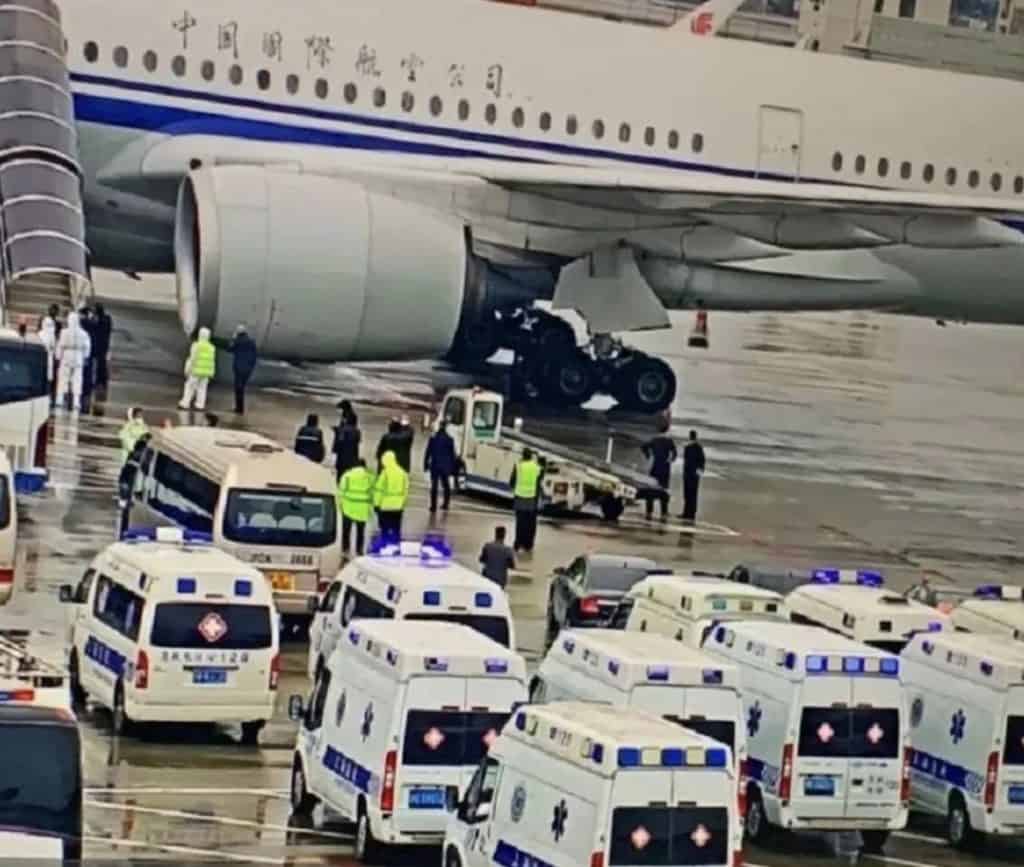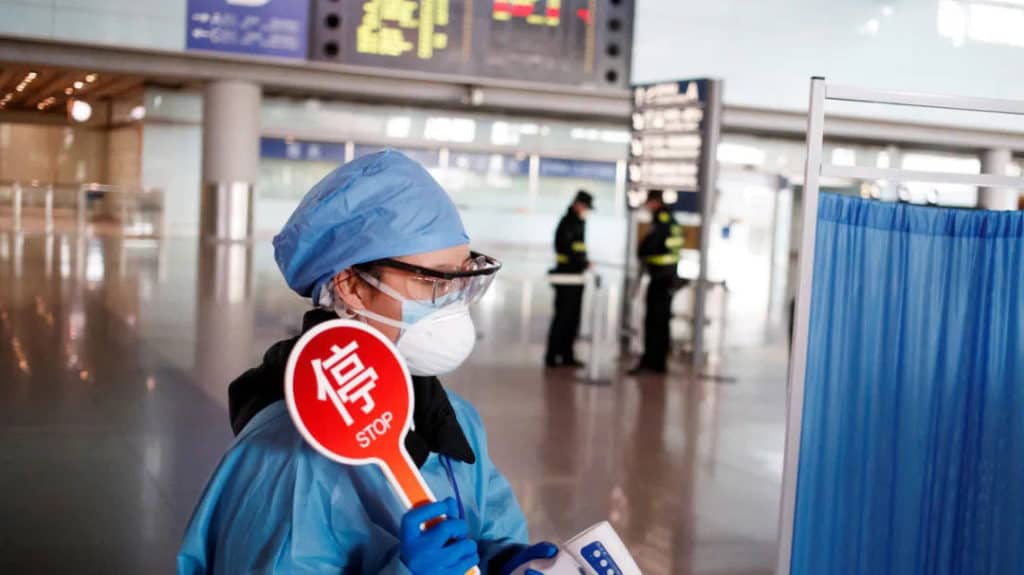Since middle of March, all international arrivals in major cities in China are now required a 14-day quarantine at a government-designated location at their own expense, even if they do not have coronavirus symptoms. The escalation in the policy comes at a time where the vast majority of new infections have been coming in from abroad.
As COVID-19 pandemic develops around the world, China has shifted its focus towards imported-case prevention and has strengthened screening on inbound international travellers, with measures including but not limited to:
- All travellers are requested to fill in Health Declaration Form before or upon arrival at immigration the counter;
- Risking rating of inbound flights and travellers based on list of criteria like country of origin, if there’s passenger with fever on board etc;
- Onboard screening after landing of flights considered high risk;
- Passport labelling based on risk rating, with designated area, process and channel for CQI clearance and transportation arrangement.
Transit Flights
Those in transit to final China destination will be held at airport and escorted to next flight.
City Specific Quarantine Info
Currently the list of high-risk countries include: Japan, South Korea, Italy, Iran, France, Germany, the United States, Spain, Switzerland, Sweden, United Kingdom, the Netherlands, Norway, Belgium, Austria and Denmark.
Beijing: All international flights will be directed to Beijing Capital International Airport (PEK). All inbound travellers, including Chinese nationals, (excluding transit travellers) will undergo a 14-day mandatory quarantine at designated locations, except for:
1. The elderly (over 70 years), minors, pregnant women and patients with other serious health conditions;
2. Those who live alone can apply for home quarantine.
Those who want to apply for home quarantine should contact or have their family members contact the neighbourhood committee prior to the trip to apply for home quarantine. The community staff will assess the residence to decide whether to grant an approval. Anyone who violates the home quarantine regulation will be sent to group quarantine immediately. The violation includes refusing to accept medical monitoring, concealing symptoms and disease, or going out without permission.
After going through the screening, customs and immigration process at the airport, travellers without symptoms will be transferred to the dispatch center in the new pavilion of China International Exhibition Center. Working groups from 16 districts of Beijing and other provinces will transfer the passengers to their destinations.
For transit passengers who will take the next flight on the same day, they could stay in the airport and follow the directions of airport staff. Transit passengers who will take the next flight on the next day should go to the dispatch center and follow the government arrangement of accommodation overnight. Diplomatic personnel who pass the temperature check should follow the directives for diplomatic personnel.
Chengdu: Since March 18th, 24 hours compulsory quarantine for testing for almost all arrivals now at CTU + 14 Days mandatory quarantine at a government-designated location if visited high-risk countries (and perhaps all travelers, reports are now coming in). For more detailed information, click here.
Chongqing: All international arrivals from high-risk countries are required a 14-day quarantine at a government-designated location at their own expense, even if they do not have coronavirus symptoms.
Hong Kong: Since March 18th, all travelers arriving in Hong Kong, except from those from Macau and Taiwan, will be put under mandatory quarantine for 2 weeks. The measure will last for three months.
Hubei Province: Movement restrictions in Hubei province are the most stringent in the country, but have started to be more flexible. The Hubei government made an announcement with regard to resumption of business and transportation. Companies are allowed to gradually resume work and production depending on the risk level of their location and sector category, and government approval is also required. A more flexible approach has also been adapted to people movement, although the government will continue to strictly control movement out of Hubei. The government has recently announced the issuance of a “health code” to enable some residents to resume movement inside the province. Green code-holders will be able to move inside Hubei, while those in high risk areas need to follow specific local regulations.The code status is refreshed on a daily basis. Personnel who need to exit Hubei need to get health certificates according to the requirements of their destination cities via an Alipay app. Those who are unable to submit an online application could seek help from their local residential committees. All levels of the Centre for Disease Control and Prevention (CDC) will not accept applications for health certificates. As to the local transportation, medium and low risk areas will gradually resume intra-province passenger flights, trains, buses, ferries and city transportation, while in Wuhan and other high risk areas they will remain suspended.
Shanghai: On 17 March, the Shanghai government announced that all Chinese and foreign inbound travellers who have been to any of the following 16 countries in the previous 14 days should be quarantined at home or at a designated location: Austria, Belgium, Denmark, France, Germany, Iran, Italy, Japan, Netherlands, Norway, South Korea, Spain, Sweden, Switzerland, UK and US. The list of key countries and regions may change in short notice with the global COVID-19 development.
For all inbound travellers, the customs and border inspection departments will attach colored labels on their passports either in red, yellow or green based on the result of the screenings.
- Passengers with green markings are directed to the channel for normal entry.
- All passengers with yellow or red markings will be separated from other people in the airports. The airport staff will work together with the airline companies, staff from 16 districts in Shanghai and from the neighboring provinces to send the passengers for quarantine at home or designated locations according to the results of investigation.
Transit passengers will be sent to check-in counters, waiting areas in the airports or train stations by dedicated staff.
Taiwan: Since March 18th, the entry of all foreign nationals is banned (with some exceptions, though no more information), and requiring a 14-day home quarantine for all arriving travelers.
Tianjin: All international arrivals are required a 14-day quarantine at a government-designated location at their own expense, even if they do not have coronavirus symptoms.
Xi’an: All international arrivals are required a 14-day quarantine at a government-designated location at their own expense, even if they do not have coronavirus symptoms.
Shenzhen: All international arrivals from or visited high-risk countries(19 countries) are required a 14-day quarantine at a government-designated location at their own expense, even if they do not have coronavirus symptoms.
Domestic Arrivals
No quarantine for domestic travel if you haven’t been abroad the last 14 days.
At the airport where you depart security should be normal, although they ask you to get there early.
Upon arrival everyone must scan the health app and will get checked one at a time. For foreigner because you can’t get the app they call and check the foreigner compound. And after calling and checking the details (which can take a while) they then write the details again on their own form and you can then exit the airport.
Compulsory Quarantine Information
Only those in “special circumstances” (although no criteria were given) will be exempted from being sent to facilities where they must pay for their stay. Reported quarantine costs are around 3500-7500RMB for 2 weeks.
Travelers from abroad without medical insurance will have to bear their own medical costs if they are suspected of carrying COVID-19 or are confirmed. For those with basic medical insurance, the expenses can be covered by medical care and local government’s subsidies.
If you have a residence in these, our suggestion is for you to contact your landlord or property manager to find out if you can get permission to return home for the 14 days quarantine.
People in compulsory quarantine report being put up at local hotels and are not allowed to leave their room. Prepared meals have been delivered to them, and some are allowing residents to order items for delivery.
Coronavirus: Read More
Epicenter – 24Hrs in Wuhan (1)
Epicenter – 24Hrs in Wuhan (2)
Should I Stay or Should I Go Now?
COVID-19 Legal Advice: Jobs + Visas
COVID-19: Chengdu Exit & Entry Rules
Stop COVID-19 Closing Your Chengdu Favorites
【kàn bù dǒng 看不懂? 】Learn Chinese NOW!COVID-19 Myth Busters! 这些到底可信吗
Is there Coronavirus in your Compound?
Putting the Coronavirus in Perspective




